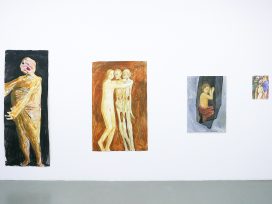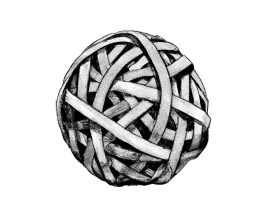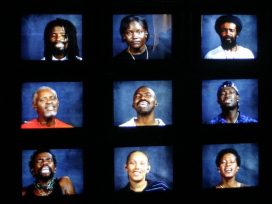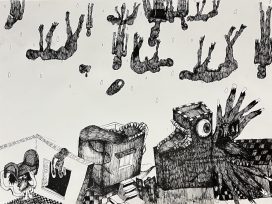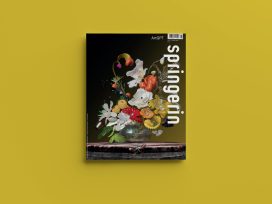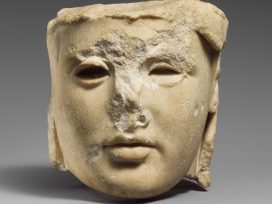I recall my visits to Podlasie, a region on the Polish border with Belarus – the border which divides extraordinary, primeval Puszcza Białowieska, the oldest Central European Forest, in half. I first visited the Forest at the age of ten. There was an oak tree in front of the house where I stayed. It looked like Kilimanjaro upside down. The Forest itself seemed like Narnia to me. The bison were grotesque, surreal and enchanting.
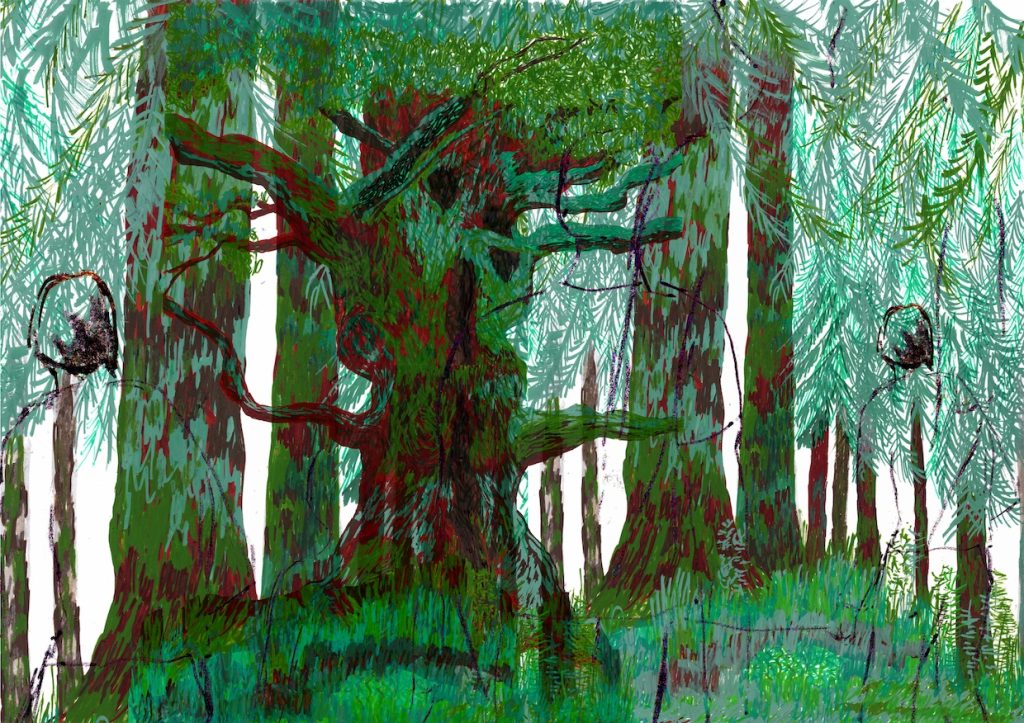
Illustration by ariel rosé
Twenty years later I visited the Forest in winter. I locked myself in a friend’s cottage, which I had to walk a few kilometres through the snow to get to. The closest neighbour, a forester, lived a kilometre away. My mobile connection was very weak. To make a phone call, I had to climb a hill and stand under the antenna. The night sky was woven with stars. During the day, I met a wolf on the path. Its eyes looked wise and calm – I had the feeling that we had been standing opposite one another for a very, very long time, like centuries. This meeting would remain with me like the positive trace a painting leaves once removed from a wall after many years.
The Forest is a society with ‘Mother Trees’. Ecologist Suzanne Simard describes them as ‘hub trees’ sharing excess carbon and nitrogen through a mycorrhizal network – like a world wide web of messages about possible danger or good light spots. Gilles Deleuze and Félix Guattari’s theory of rhizomes and roots also comes to mind. The non-linear network that connects us with plants and animals makes perfect sense here. Philosopher Éduard Glissant noticed that roots ‘make the commonality of errantry and exile’, which might seem an oxymoron to us. But there is a point to it, ‘for in both instances roots are lacking’.
Refugees, exiles, immigrants and nomads abandon their roots. They abandon the graves of their ancestors and wander rootless. Yet, ‘the tale of errantry is the tale of Relation’, adds Glissant. Refugees are a moving element related to the place and its inhabitants. They make a new special entity. The border they wish to cross is a construct of the Westphalian world order, which Carl Schmitt deemed Ius Publicum Europaeum (European public law), relatively fresh and not sacred, not delineated by gods. Achille Mbembe calls for a borderless globe, for a freedom of mobility. Refugees who lose their lives attempting to cross the Polish-Belarusian border are cut off from their families in Africa or East Asia. Who will visit their graves?
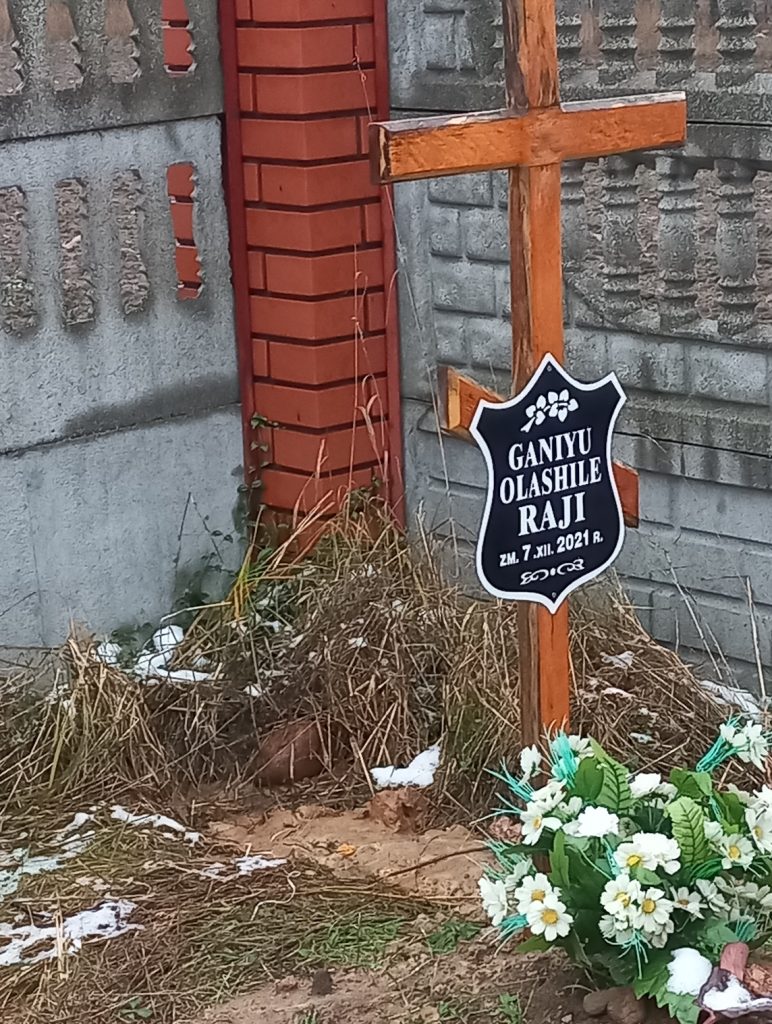
Ganiyu Olashile Raji’s grave (date of death 7 December 2021), corner of Orthodox cemetery, Narewka. Photo courtesy of the author
A humanitarian crisis has been ongoing within this Forest for three years. The face of the Forest has changed – or rather the face of the Forest has been changed.
* * *
I returned to Podlasie in 2022 after the Polish right-wing government introduced a state of emergency in regions along the border. The army had begun guarding an area of the Forest that was closed to everyone other than its inhabitants. I wanted to know how I could help. Or maybe I wanted to understand for myself what was happening. The army did not let me inside the area to visit my friends living in Narewka. Carl Schmitt in his 1921 essay ‘On Dictatorship’, which he later developed in Political Theology, describes such a state of emergency, whereby an authoritarian ruler can ignore the law in case of unexpected circumstances and introduce new rules: ‘Sovereign is he who decides on the exception.’
In 2021 President Alexander Lukashenko in collusion with Vladamir Putin started handing out visas to refugees and immigrants from Iraq, Afghanistan, and other Middle Eastern and African countries. Belarusian authorities pushed for their transfer across the border to Poland, Lithuania and Latvia, weaponizing refugees against the European Union, thus waging hybrid warfare. Lukashenko’s government knew that an increasingly right-wing-leaning Europe wanted to limit immigration. And his immigration policy was direct retaliation to sanctions that the EU had imposed after the rigged Belarusian presidential elections in 2020 and repression of the opposition.
In August 2021, when a group of refugees from Afghanistan appeared at the border near the village of Usnarz Górny, the Polish right-wing, anti-immigration government, led by the Law and Justice party (PiS), was still in power. The refugees, who weren’t allowed to apply for asylum, were pushed back by the Polish guards on the one side and then again by the Belarusian guards on the other, stuck in the Forest without food, water or shelter.
Shortly thereafter, the Polish government introduced a provisional state of emergency in its border regions with Belarus. No one other than residents were allowed to stay in the designated zone. Any assistance given to refugees became punishable. In January 2022 the PiS government began building a razor-wire fence along the border, which is now approximately 180 km long, 5.5 metres high and cost PLN 1.6 billion (350 million euros) – the money coming from an EU budget for road construction. Poland used money de facto from the European fund despite the objection of Ursula von der Leyen. The state of emergency, first scheduled until 1 March 2022, was extended until the end of June. And the current government under Donald Tusk has since reintroduced a closed zone along the border.
In 2022, and again in August and November 2023, I helped refugees in the Forest from the base camp of volunteer group Grupa Granica (Border Group) and at a seminar organized by Researchers at the Border. I spoke mainly with those who help at the border: the activists, volunteers, residents and visitors, who do so from the kindness of their hearts, and are exhausted, traumatized and harassed. It became clear to me that the work they do should be done by the state, which has instead built a fence on which people and animals die. All my interlocutors repeated the same sentiments about volunteering near the forest: I don’t want to talk about it anymore, it has become traumatic, I’m very tired.
I returned once more in May 2024 at the invitation of the Poezja w Puszczy (Poetry in the Forest) festival. The idea for the festival developed on the spur of the moment in 2016 when Kasia Leszczyńska, a translator of German-language literature into Polish, was contacted by a poet living in Hajnówka, a small border town where Catholic and Orthodox churches are neighbours, and Belarusian is heard on the streets as often as Polish. The poet was determined to establish a poetry festival in Podlasie and the first event took place in 2017. The Tropinka Association for Dialogue, which promotes intercultural dialogue and the promotion of Podlasie culture, was also founded at that time. I received their invitation for a residency place and stayed in the same location for the festival.
The festival is low key and intimate – you could say there’s magic in it. Poets and the public wander through the Forest for half a day, stopping at designated places where poets recite their work. María Baranda opened the proceedings by reading her poem Todos los árboles del mundo (All the trees of the world) in a calm voice, concluding with ‘de esa noche quieta, primera y última, donde siempre estarás con todos los árboles del mundo’ (of that quiet night, first and last, where you will remain with all the trees in the world) – all the trees in the Forest around us, which we had managed to protect from being felled first under the directive of the PiS government.
I closed our procession by reading several of my poems in the middle of the Forest, right next to a fallen tree; according to law, all collapsed trees, of which there are many in the Forest, must be left to decompose, providing food for fungi and insects. We admired several such fungi along the way, documenting them on our mobile phones, stretching out our procession for a kilometre. I read a poem from North Parables, written many years ago in a nature reserve in northern Finland, an extraordinary forest where humans are rare guests and lichen hang from trees in garlands. I read a poem from the sea at night is a muscle of the heart about the loss of a loved one, written in the middle of a Norwegian forest, where moss grows like hair on stones and rocks are covered with lichen tattoos.
And I felt as if these Forests had merged. As if I were an echo of the Forest. We were standing in the middle of an ancient forest and I was reading about an ancient forest. The Forests intertwined. And suddenly a large bird broke away from the branch.
I call the water and a bird rises up
and shows me its wing
and there is a forest, and there is smoke, and there is fog
the fog laughs, your hands are dirty, your legs are dirty
the fog laughs, then the bird breaks away from the forest
like a sound from silence
the sound of rain, I hear tiny footsteps
against the birch leaves, against the maple leaves, against the oak leaves
against the earth, against the water
and I thank you for the footprint on the water of the dried-up river
I thank you for the leaves of the tree trunk that will not grow
I thank you for the melody of the name that I will not call
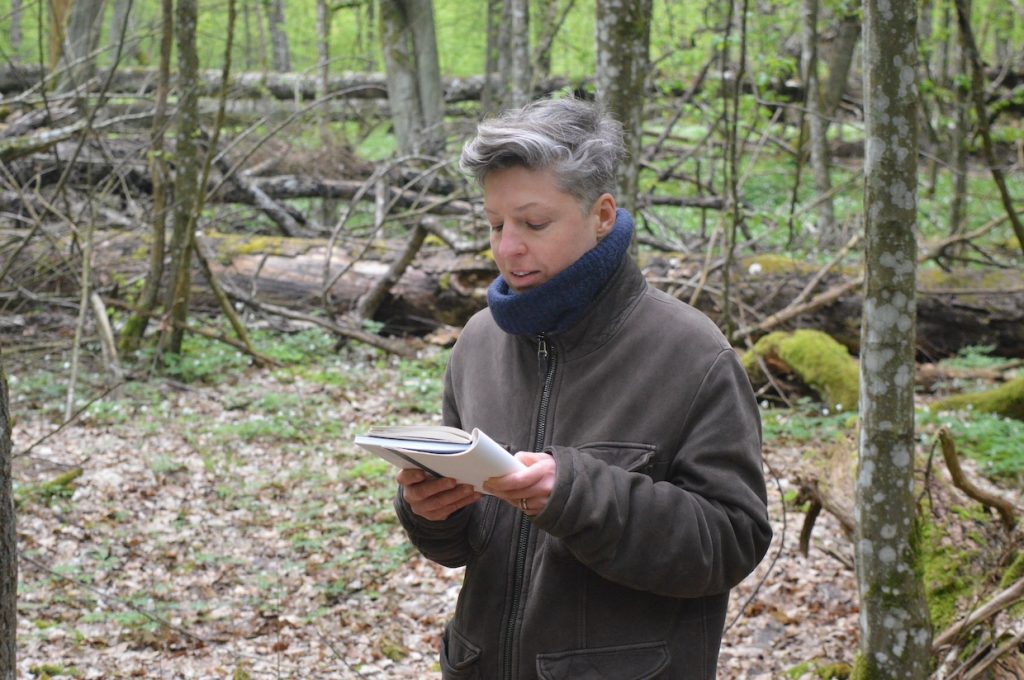
ariel rosé, May 2024. Image by Olena Sarzhenko, courtesy of the author
After our walk in the Forest, we were invited for dinner at Fanaberia, a locally renowned restaurant in Białowieża founded by Sławek and Lucyna Droń. As a child, Sławek came to Podlasie for holidays with his grandfather, who was the head of the Baptist church in Białowieża from 1948 to 1984. Fanaberia is an institution: a port, a base, a gallery, a meeting place. Literary meetings, film screenings and exhibitions are organized there. We sit down at the table and Ruth immediately serves us pumpkin soup. I slowly feel the warmth spreading through my body. Sławek sits down next to us – tall in a light shirt and jeans, gray-haired, his face an open, legible space. I ask him about when they started the restaurant, the paintings on the walls, who he employs in the restaurant and on what terms. He replies with an anecdote about one of his employees:
I had to dig a trench for a pipe with Abraham once. We were digging, digging, and suddenly he started laughing so hard, so I asked him what was going on, and he said: ‘I was digging recently, three kilometres from here.
The border with Belarus is three kilometres east of the restaurant, under which Abraham managed to pass by digging a hole. Sławek hired Abraham sometime later. At first, he was not familiar with kitchen work. ‘Now he makes better pierogi (Polish dumplings) than the locals,’ says Sławek laughing.
Apart from Abraham, who fled from Ethiopia, there are two members of staff from Eritrea (one of them is an obstetrician by profession) and Ruth from Congo, who took our order when we arrived cold and hungry after our walk in the Forest. She is of average height, moves smoothly and has attentive eyes. She came here to work two years ago, at the age of sixteen. Her mother disappeared at the border and Ruth was sent to an orphanage. The director called Sławek to see if he could find her a job. She speaks French and Swahili. She learned things slowly, cleaning and setting the tables.
‘Many people want to apply for asylum but sometimes have to wait for up to five or six hours before the border guard arrives, so I’ve heard,’ says Paulina Weremiuk, a local border resident, whom I’m speaking with for the second time since she received the Paul Grüninger Award in St. Gallen, Switzerland, for helping refugees in the Forest. Since then, she has helped sporadically. Now it’s mainly activists who deal with refugees. ‘It was physically and emotionally exhausting,’ she says, ‘I had to set a boundary for myself.’
I see two different boundaries or borders running somewhat parallel to each other. Paulina teaches English at a primary school in Narewka. She can only go to the Forest at weekends. Recently she received a message from the Border Group, a call to go to a young man in the Forest. He needed water, food. Four hours passed from the moment Paulina received the message until she returned home. She couldn’t stay with him any longer: he had asked for international protection, but Paulina had to go to work the next day. Someone else came to help him.
Paulina lives in Narewka and comes from nearby Hajnówka. When we talked in November, her voice was warm and soft, flowing smoothly into me. Now it is broken. ‘I thought the world would see us helping.’ Instead, she feels hostility. She is afraid of impending aggression. She fears that her help will be used against her. Volunteers and activists are accused of collaborating with smugglers. Did anyone inform on Paulina? In Narewka, no one will say anything directly, but she has been accused of smuggling refugees. It hurts her that trusted people gossip.
A few days later, an entry appears on the Facebook profile of an ultranationalist organization Narodowa Hajnówka (National Hajnówka) calling to chase activists and ‘illegal immigrants’ away: ‘After a few hours of walking, we came across a large group of illegal immigrants that escaped from us. We will repeat this type of action’ … ‘where the state fails, citizens must show up’. On 25 July 2024, the Senate adopted a law on the use of weapons on the border, which has since been signed by the president. A soldier who uses weapons in an irregular manner is now exempt from liability. Violence has been sanctioned.
Every crack of a branch broken in the Forest makes Paulina suspect that someone needs help. She is angry about the new regulations that do not allow her to go for a walk with her dog to her favorite places. She is afraid whether she can invite friends from abroad. Can people of colour or those with Arab facial features freely go for a walk in the Forest?
I ask if Paulina has hope for the future. But she replies that she had hoped Donald Tusk’s new government would have a long-term plan and take into account people on the road, residents and nature. Instead, it has re-established the emergency zone and took one third of her Swiss award in taxes.
Katarzyna Leszczyńska had a similar hope. Kasia has light, curly hair and a smile that instantly makes friends. She lives between Zurich, Warsaw and the Forest. She was in Zurich when the PiS closed the border in 2021. ‘The whole region became an anathema,’ she recalls. She felt guilty for not being there and not helping. ‘It was a liminal situation,’ she says, and I see another border squeezing the Forest. She began to feel afraid of the place that was so dear to her. What helped her to deal with the crisis? Meeting refugees, knowing that she could do something for them.
Once, friends called to ask if Kasia and her husband, Manfred, could hide two men – probably a father and his young-adult son – in their barn. However, they preferred to hide them in their old, wooden railway , which they had converted into a cosy place to spend the night. ‘It was tragic that in a supposedly democratic country you have to wonder and worry about how to get two people from a barn to a wagon!’ A neighbour’s dog ran up to them and started licking their hands. The older man, who had not shown any emotion so far, probably due to exhaustion, suddenly looked fearful. Kasia took the younger man’s hand and started petting the dog with it, until he finally started petting it himself. After three nights, they disappeared. Sometimes water and food left in and near the Forest also disappears.
The reasons activists from Grupa Granica stay at the border and help is frequently similar. When I visit the base in the summer of 2023 to arrange my longer stay for the autumn, I pass armoured military vehicles. Soldiers can be seen everywhere: at gas stations, in cafés, in shops. The activists’ base contains a warehouse full of shoes, clothes, sleeping bags, power banks, phones and dry, high-calorie food: from December 2022 to January 2023, activists have provided aid to 14,500 people.
Many other organizations, associations and grassroots initiatives contribute to the work of activists. Kuchnia Konfliktu (the Conflict Kitchen Foundation) provides hot soup. Stowarzyszenie Interwencji Prawnej (the Association for Legal Intervention) makes sure there’s always one lawyer on board who explains how to apply for asylum. There are translators of Arabic. ‘It’s good that you know French,’ I hear on the first day. ‘That could come in handy.’ The Egala Association legally supports the activists themselves. There is also no shortage of psychologists. A separate room at the base serves as a small infirmary, where I end up after stumbling and splitting my chin while walking at night. A doctor helps me. The walls around us are tightly wrapped in dressings, plasters, bandages. I feel like an idiot – I am not the one who should be helped.
When I return at the end of 2023, fatigue hangs in the air like thick fog. Of the people I meet, some of them have been helping regularly for two years and lived at the base. Others come for several to a dozen days. Several are employed by the group like Magda, who is around 50 years old. ‘I was standing a few metres from the soldier when he was pointing a gun at me,’ she says. I’m sitting on a bed on the first floor of an old wooden cottage in a village right next to the border. During the First World War, the Russian army burned the village. After it was rebuilt, the Nazis burned it down during the Second World War. It was rebuilt again according to the pattern. The even layout of the wooden houses and their architecture are reminiscent of cottages from the eighteenth century.
‘It’s very cosy here,’ says Matthias, who has come to help from Germany for two weeks. I’m tired after driving all day. Magda sits on the floor and doesn’t stop talking and speaks fast. Her voice is a herd of deer running through the Forest. I can’t keep up with them. My mind delves into the moss. I hear fragments of staccato sentences. The Forest is her Heimat (homeland). She has a small farm with her husband. A teenage son. Her chickens recently died. Probably poisoned grain. It hurt her. Magda takes photos. Once the Forest was her topic. She shows me photos of trees, morning fog, cranes by the river. Now she is documenting the work of the Border Group. She doesn’t add credits to her photos. She’s not doing it for publicity. I see the Afghan’s frostbitten feet. Syrians in sleeping bags. A medic treating a wound on the leg of a man from Senegal. ‘Shoot then if you’re so brave,’ she told the soldier, turning on her heel and running home to get a camera to capture the scene.
From the Border Group base, I go to the writers’ residency in Hruszki. Researchers at the border meet for a seminar on the humanitarian crisis. ‘I came to the Forest ten years ago to live in peace,’ says artist and director Kasia Hertz. There has been no peace here since then. First, activists fought against tree felling. Now, they are fighting for the lives of refugees in the border zone. According to anthropologist Elizabeth Dunn, who deals with forced migration, the Forest did the border guards’ dirty work. Does that absolve the guards? Does Puszcza have intentions? Kasia has a delicate voice, blonde bangs and large, dark eyes. She talks about how she supports escaping children to overcome the trauma of the Forest. It helps them create a new narrative about what they have experienced. One girl came up with a story about a tree under which she could take shelter. Under its leaves she was warm at night. The tree revealed the moon to her so that the night wouldn’t seem so dark.
The extraordinary nature of the Forest has disappeared. I feel tense. Wherever we go, there is armed presence. Once we would have gone deep into the Forest. This time we are going to see the fence. I am reminded of philosopher Wendy Brown’s words, for whom a wall does not testify to a nation state, quite the opposite. For her, the epidemic of building walls is evidence of the corrosion of a sovereign state, not its power. Why do I need to see a barrier? Isn’t a photo enough for me? I want to feel the earth where it is divided. We look at the fence from different perspectives, as if it was a painting that gains from a slightly zoomed-out view.
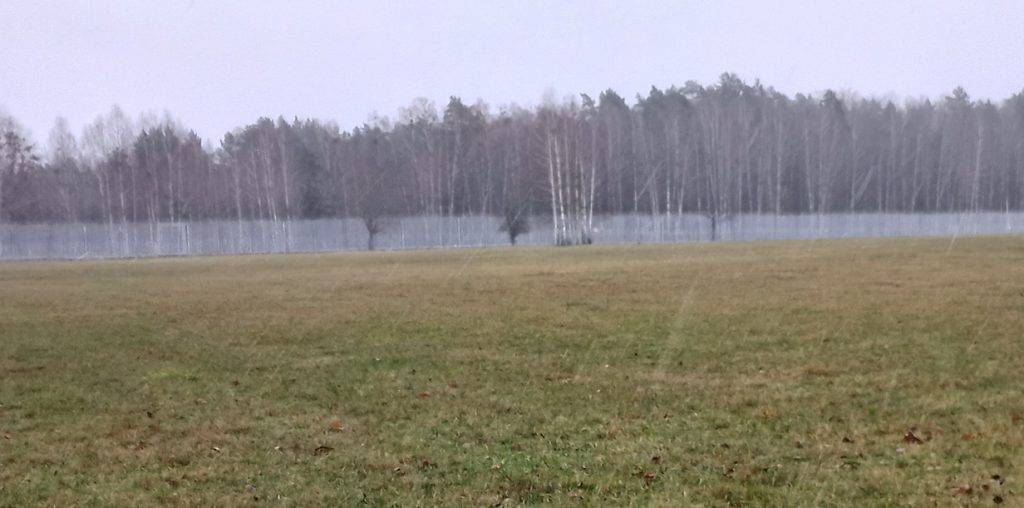
Polish-Belarus border fence. Image courtesy of the author
The gate for animals is padlocked. There must be a bell somewhere for the bison. The Forest is an ecosystem, a country in itself – by dividing it artificially, we break the connection between plants and animals that used to move freely through its territory, looking for food or shelter. What is our role then? ‘Human beings offer hospitality only to human beings,’ claims Jacques Derrida. ‘True, what a strange thing it would be to go and offer hospitality to an animal, all the more to a plant! Let’s be reassured, hospitality is definitely a human characteristic,’ he adds but does not stop there. After some further consideration, he arrives at some hyperbole that inspires us to be humble: ‘If you don’t do justice to hospitality toward animals, you are also excluding gods.’
How many people has the border ‘swallowed’? I’m checking the report on the Border Group website: over fifty. More than three hundred have been reported missing. At the Orthodox cemetery in Narewka, in the corner next to one another, are three small burial mounds: Mohsen Ahmed Mugahed (Yemen, 26 years old), Waseem Abojesh (Syria, 21 years old), Ganiyu Olashile Raji (date of death 7 December 2021). The border guard publishes the number of people trying to cross the border on its website: by July 2022 there were almost forty-four thousand; over forty-one thousand were ‘turned back’ – according to the guards’ nomenclature – or pushed back. Only the first refoulement is registered. Refugees experience violence on both sides.
A reliable report was prepared by Felipe González Morales, who until 2023 was the UN Special Rapporteur appointed by the Human Rights Council. However, this report, so far, is a love letter to no one. According to the Association for Legal Intervention and Protecting Rights at Borders, 9,515 push-backs have been documented across Europe from May to August 2023. Every third person is a child. The new EU migration law assumes that each member state will accept 30,000 immigrants or pay 20,000 euros for each person not accepted. The Polish government vetoed the law, despite some courts deeming the push-back law illegal.
Returning from the border, we notice a banner with a photo of a dead bison and two people from the Bison Lovers Association in the parking lot. They are drinking tea from a thermos, a small drum next to it. Not far from there in Stare Masiewo on 12 November, a military truck killed a bison. The soldier must have been driving a hundred kilometres per hour. No one was held responsible.
Many refugees lose their lives trying to cross the slender Svislach River. The river and the border line up like lovers. Cyril, the 32-year-old son of Zala Marciale from Cameroon, drowned in it. Who was he? We drive nearby to the village of Dublany. According to the 2021 census, two women live here, but the village seems abandoned. As if people fled a hundred years ago in panic. It is as quiet as in outer space. Wooden huts stand empty. Cotton wool lies in the windows with golden baubles placed on top. Orphaned apiaries. You can hear birds everywhere. They feel safe, they fly close. The road bends upwards. You can’t see the river below. All you can see is razor wire and a field kitchen, from which smoke curls: the army on the border. Behind us on the hill is a border guard vehicle. The guard drives away. We wander around the hill for a while. We return to the car. The guard is waiting on the road. A woman and a man get out. They want to see our IDs. ‘You can’t come any closer than fifteen metres,’ a heavily made-up guard instructs me. Is the border burning? They’re noting us down. They have no right to do this, but I don’t want to know the rest of it. It’s cold, ashen and dull. The guard says, ‘It’s nice here, isn’t it?’
* * *
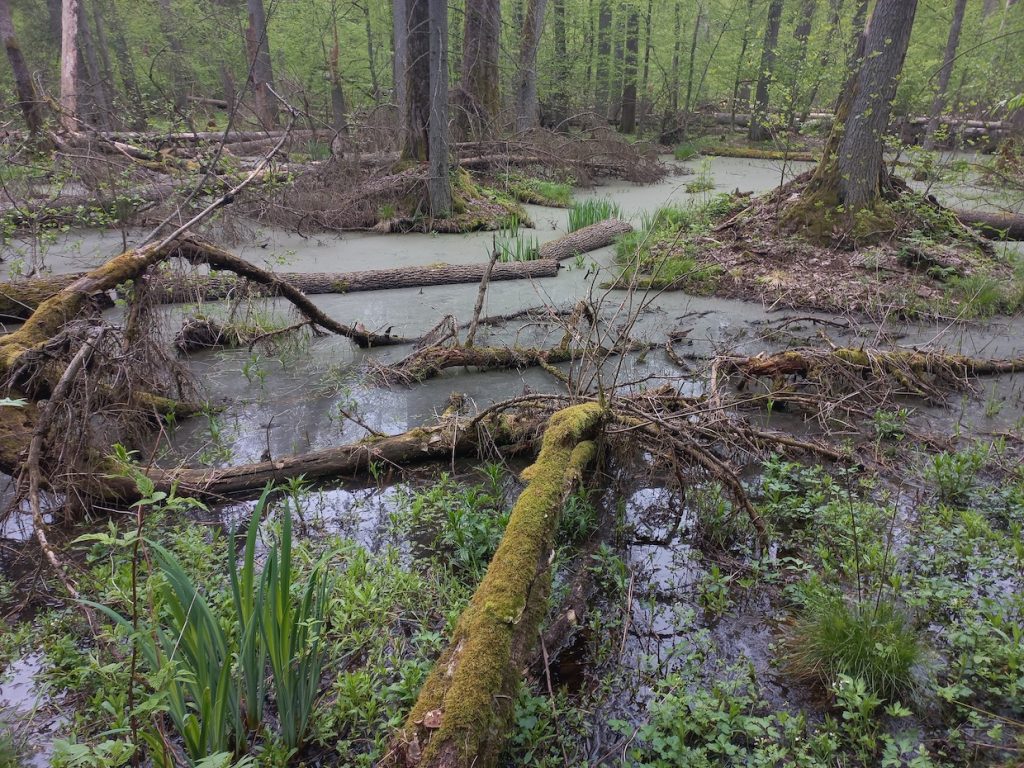
Puszcza Białowieska Forest. Photo courtesy of the author
I want to reclaim the Forest for myself. As part of the Poetry in the Forest festival, we go for a walk to its enclosed kingdom. There is a warning hanging at the entrance gate: ‘Attention! Soldiers, policemen and other officers! If you enter the Białowieża National Park’s strict protection area through the gate without being on duty, you are breaking the law.’ You can only enter the Forest with a licensed guide. Fewer and fewer people come here; they are afraid. The guide showing us around is very excited; she misses the Forest now that she spends most of her days in the laboratory. The trees, the great forest infrastructure with lichens clinging to bark, branches sticking out from under the forest floor like the hands of a drowned person calling for help, fallen trees sleeping on the ground – I was in a gallery of people turned into pines, spruces, oaks. Daphne turned into a laurel tree to escape the greedy Apollo. But Apollo wasn’t discouraged: he loved Daphne even in the form of laurel. I believe that was the case. The Cherokee called trees ‘Standing People’.
This seems to be what eternity looks like, I then thought. I searched for words for it, to no avail. ‘Every poetics,’ writes Glissant, ‘is a palliative for eternity.’ The huge primeval Forest on the Polish-Belarusian border is a living fossil. It hosts many endangered species. Their design amazes me. Their Polish names endearingly tickle my imagination: fungi pniarek obrzeżony (red-belted conk) and pniarek różowy (Rhodofomes roseus). They resemble auricles. The Forest hears more than us.
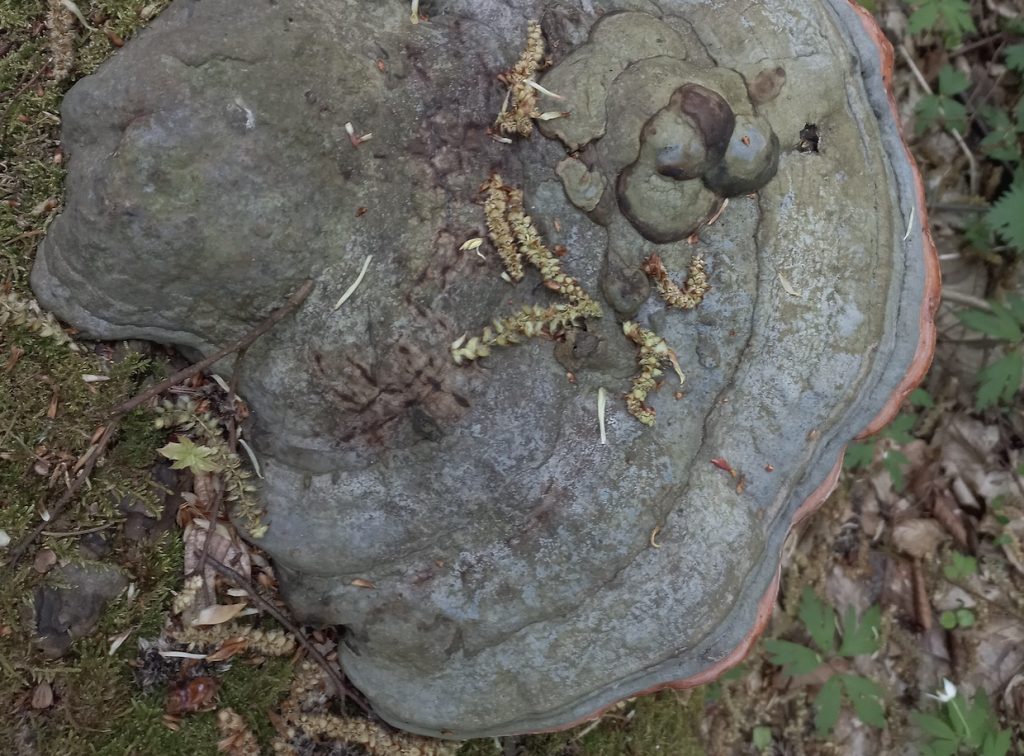
Fungi in Puszcza Białowieska Forest. Photo courtesy of the author
A version of this essay will appear in Both Sides Face East: Borders De Todos Lados, Academic Studies Press, edited by Christian Fernandez Huerta, Alisa Slaughter and Julia Sushytska, with contributions by Ukrainian, Mexican and other international writers.
